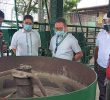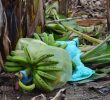The ban is stifling small traders with how they can make ends meet. Now they wonder whether the law is there to help the environment — or just to single out people who struggle to put food on their table by selling what they can at the wet market.
By MICK M. BASA
Davao Today
DAVAO CITY, Philippines — Every morning, Agdao Public Market is fringed with long queues. It’s an ordinary scene at the wet market except that it’s the vendors who wait in line, making sure they get their daily ration of biodegradable plastic bags.
Josalle Linasam, 31, says she had to do this regularly since two weeks ago, after Davao City implemented a ban on the use of non-recyclable plastic bags.
“It’s really hard. We have to adjust to the whims of the cellophane trader. They (trader) only give two packs for each of us,” Linasam said, as she plucks the leaves of spinach she sells in her stall.
“So when sales are high, we would run out of (biodegradable) plastic bags because it’s not easy to just buy for more,” she added.
Davao wants to cut pollution by prohibiting the use of non-biodegradable plastic. Lawmakers passed the ordinance in 2009 but it was only enforced this year. Now, plastic manufacturers are required to produce non-biodegradable plastics, one that decomposes in three months when disposed in landfills.
The Department of Environment and Natural Resources (DENR) said the bulk of garbage are non-biodegradable plastics from waterways, totaling to 17,087 kilograms.
And it’s exactly why this kind of plastic is now prohibited. When disposed improperly, they clog the waterways and cause flooding when there’s torrential downpour, said Jim Sampulna, DENR’s regional chief.
Joseph Felizarta, Davao’s environment officer, also said that their intention of prohibiting non-biodegradable plastic is to lessen the impact of climate change since it releases dioxin, a highly toxic compound.
“If non-biodegrable plastics are also thrown into sanitary landfills, they produce methane gases,” Felizarta added.
“Our expenses have increased and we are facing deficit,” Linasam said.
At the Bankerohan Public Market, the city’s biggest market, vendors also lament against the plastic ban. Fruit vendor Cinderella Ronquillo, 62, says her profit “are now used up with the purchase of (non-biodegradable) plastics.”
Two packs of 50 biodegradable cellophane bags, says Ronquillo, would cost her PHP 64 (USD 1.51). The non-biodegradable plastic only costs PHP 20 per bag (USD 0.48). Now, the premium she pays is cutting her average income worth PHP 780 (USD 18.64).
“And I still have to pay 210 pesos (USD 5.02) for my daily rent here. And not all days are good business,” Ronquillo said while she waits for customers to buy her bananas.
The ban is stifling small traders with how they can make ends meet. Now they wonder whether the law is there to help the environment — or just to single out people who struggle to put food on their table by selling what they can at the wet market.
“We can’t do anything. We have to follow it or else we will have to pay fines,” said Linasam. (Mick M. Basa/davaotoday.com)
World









